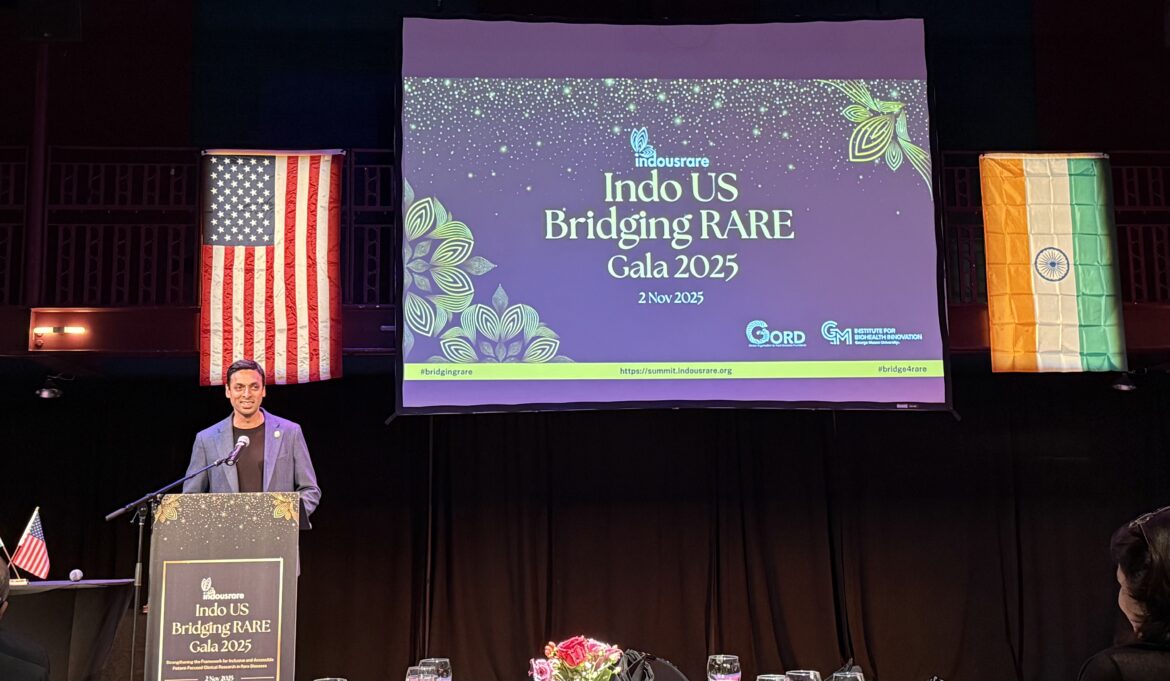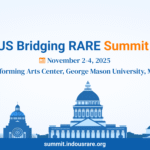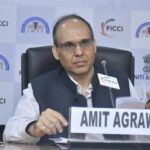In a stirring message of solidarity to the rare disease community, Virginia Congressman Suhas Subramanyam pledged to be their “champion in Congress,” underscoring the critical need for sustained funding, research, and legislative support to address the growing challenges faced by millions of Americans living with rare diseases.
Speaking at the Annual Indo-US Bridging RARE Summit 2025 Gala held on November 2, 2025, at the Hylton Performing Arts Center, George Mason University in Manassas, Congressman Subramanyam highlighted Northern Virginia’s role as a hub of medical innovation and research.
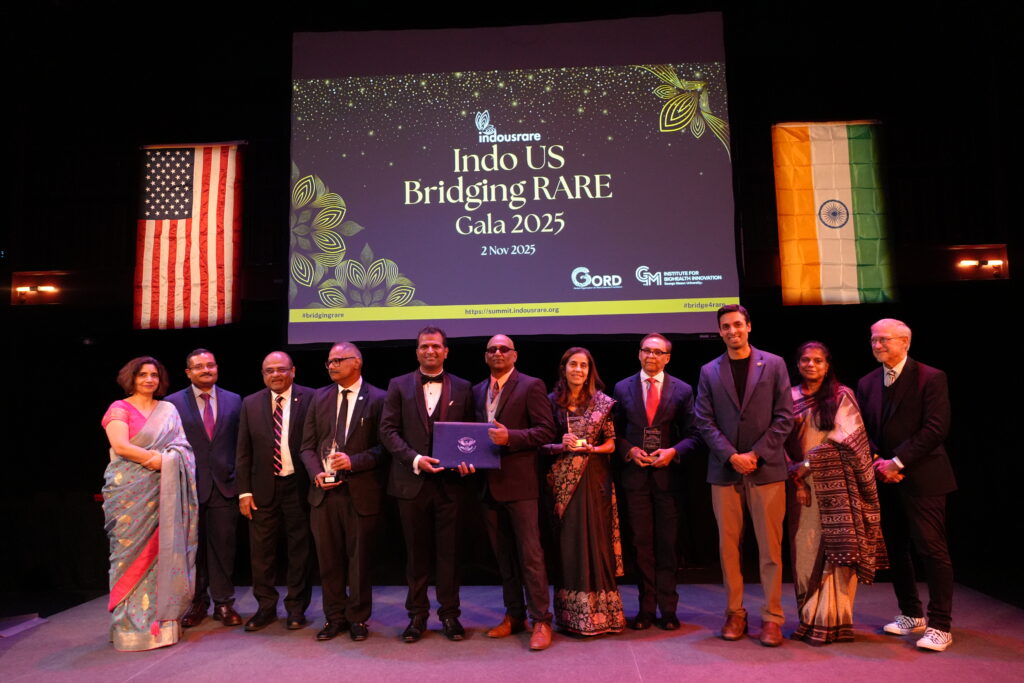
“Manassas is home to a lot of important medical research facilities,” he noted, emphasizing his deep concern about potential cuts to federal funding for rare disease research. “Since I was elected to Congress, I’ve been deeply concerned about cuts to that kind of research and cuts to funding RARE diseases. I joined the RARE disease caucus in Congress. I created a RARE disease coalition when I was in the [Virginia] state legislature.”
The Congressman’s message was clear and personal: “Consider me a champion in Congress, and if I’m not the right person in Congress, we’ll find the right person together, and we’ll try to make sure that they’re supportive as well.”
Congressman Subramanyam shared that within just minutes of arriving at the event, he had already heard several innovative ideas for tackling rare disease challenges. “So, I thought of several bills already just for being here for 10 minutes. If we can spend many hours together, many years together, we can do a lot of great work and save a lot of lives too,” he said to a round of applause.
Focus on Collaboration and Inclusion
The summit, chaired by Dr. Harsha Rajasimha, founder of IndoUSrare and CEO of Jeeva Informatics, brought together leading voices from medicine, policy, academia, and advocacy. Welcoming attendees, Dr. Rajasimha outlined the summit’s focus on six key pillars to accelerate inclusive and patient-centric clinical research for rare diseases.
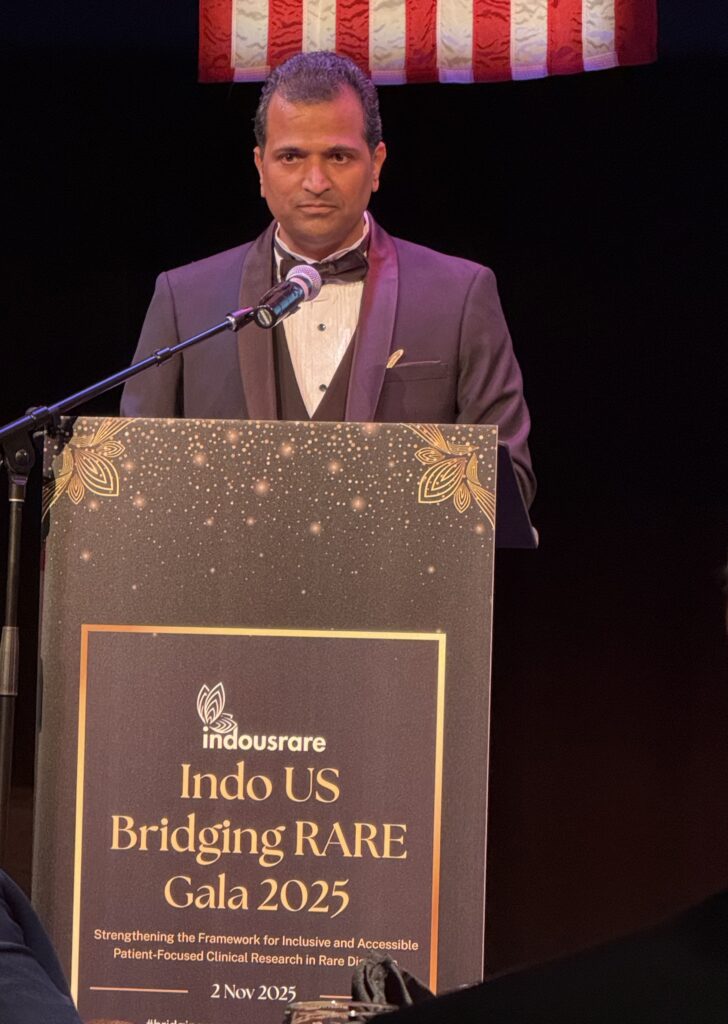
He spoke candidly about the global challenges that continue to hamper progress in this field, including the lack of approved treatments and limited access to clinical trials. Reflecting on his personal experience as the father of Kushi, who had a rare disease, Dr. Rajasimha emphasized how this loss strengthened his resolve to fight for equity and representation in rare disease research.
He reiterated the organization’s mission to bridge global gaps in research and patient advocacy. “We must ensure that all patient populations are well represented in research,” he said, acknowledging collaborations with George Mason University and the growing support from community leaders and scientific partners.
Dr. Rajasimha also announced the formation of four new working groups that will identify opportunities and build on the complementary strengths between India and the United States in rare disease research and drug development.
A Call for Global Advocacy and Awareness
Delivering the keynote address, Dr. Bobby Mukkamala, the first Indian American physician to become President of the American Medical Association (AMA), shared his personal journey, including how a rare condition shaped his medical and advocacy career.
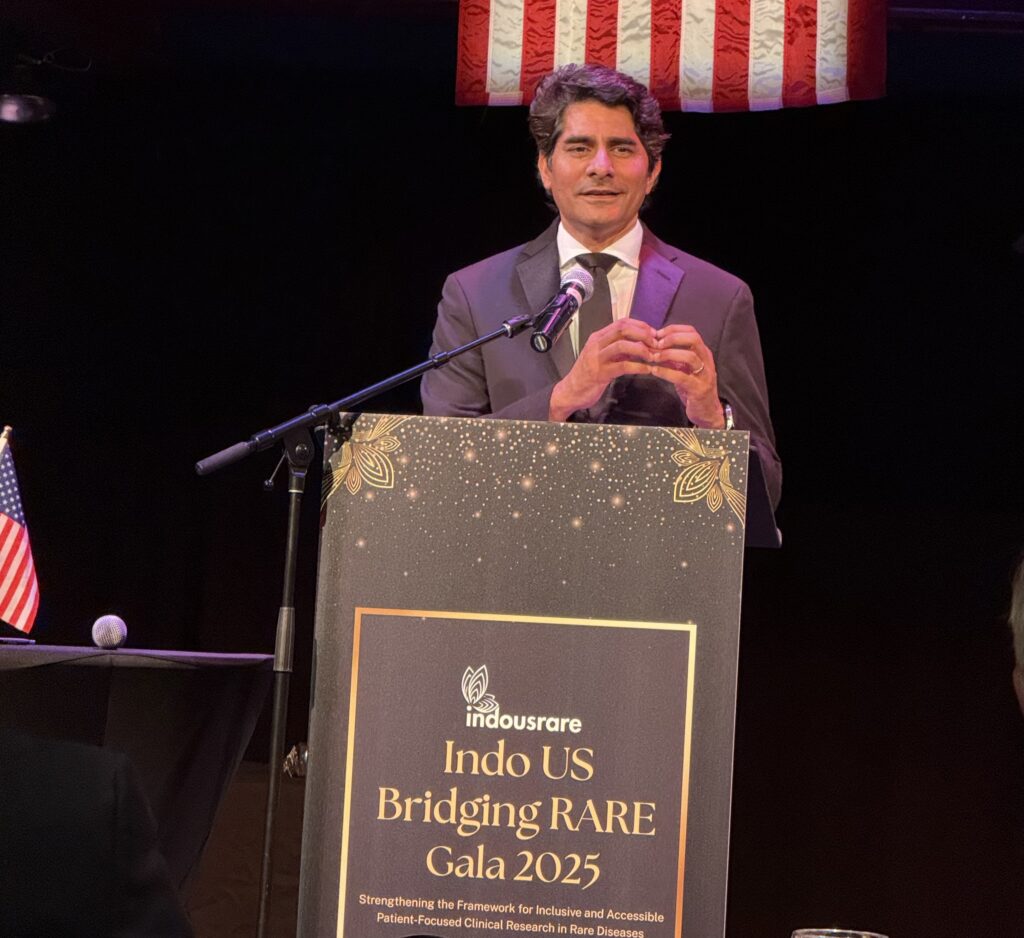
He recalled leading AMA trustees on a visit to India to explore the diversity of healthcare systems – from hospitals serving underprivileged patients to the high-tech facilities of Apollo Hospitals in Hyderabad. “It was an amazing experience,” he said, describing the stark contrast as a lesson in equity and access.
Dr. Mukkamala underscored that 30 million Americans live with rare disease conditions, many of whom struggle for years to receive an accurate diagnosis. “It takes a long time to get to the point of diagnosing and curing these problems,” he said. “That’s a challenge the medical community continues to face.”
He added that the AMA “is very much involved in advocating for research into these programs, and we support public-private intersection and partnerships to help with these issues.”
The physician also addressed systemic shortcomings in preventive healthcare. Comparing two conditions, he observed, “This country is good for Astrocytoma grade 2 diagnosis but is a terrible country to be in for prediabetes condition.” In Michigan, he said, there are countless billboards advertising joint and hernia surgeries, but “there is not a single billboard advertising for the prediabetes condition.”
He urged for a stronger national focus on prevention, early diagnosis, and access to care, noting that collaboration among policymakers, clinicians, and researchers remains the key to improving health outcomes.
Academia and Policy Leaders Weigh In
Dr. Frank Sasinowski of IndoUSrare and Hyman, Phelps & McNamara PC, was introduced by Dr. Rajasimha as a “legendary figure” in the rare disease community. Dr. Sasinowski, a pivotal contributor to the Orphan Drug Act, recounted the early struggles of rare disease advocacy, from limited funding to skepticism within the pharmaceutical industry.
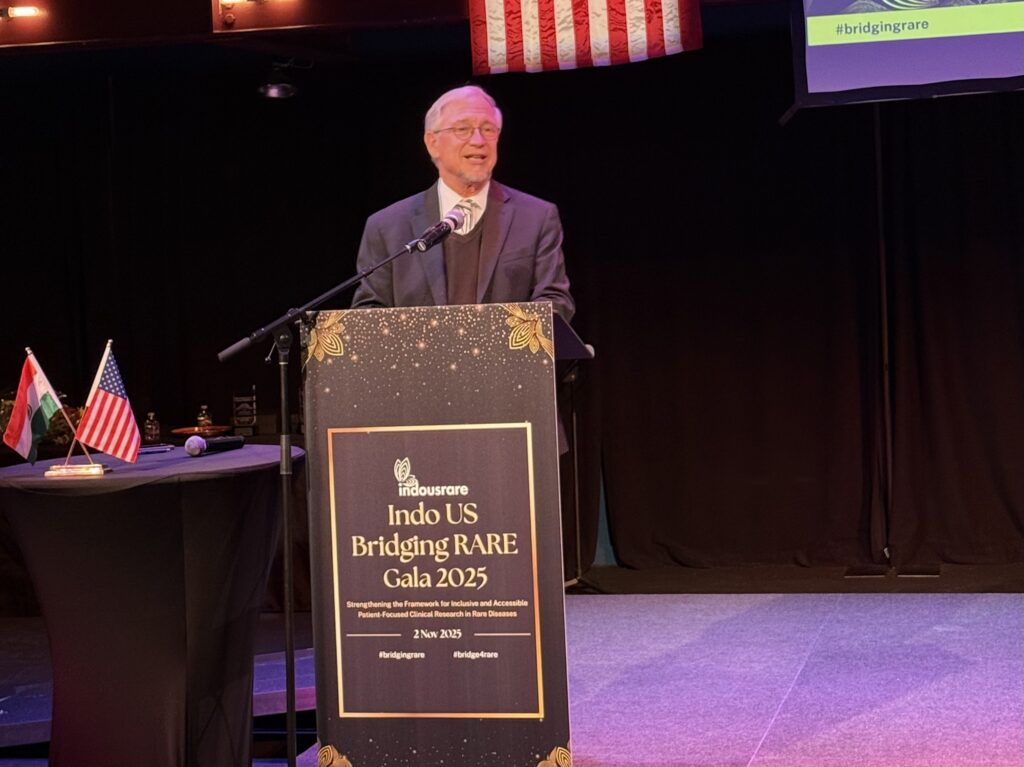
He spoke about the remarkable progress since – including the advent of gene therapies – and the collective resilience of patients and scientists working to overcome the “diagnostic odyssey.”
Executive Director of the George Mason University Institute for Biohealth Innovation, Dr. Amy Adams, expressed her gratitude for hosting the summit and reflected emotionally on her experience from previous gatherings. She commended the event’s mission of uniting scientific innovation with compassion. “Collaboration is the engine of discovery,” she said, thanking the organizing committee and attendees for their dedication to the cause.
President and CEO of the National Minority Quality Forum, Dr. Gary Puckering, shared his own unconventional path into science and medicine – one that began, he said, “with a book I picked up at Costco.” He discussed the need to respect the biological “laws of nature” in designing healthcare systems and warned against policy decisions that “introduce chaos into biological systems.”
He called for deeper collaboration across disciplines to ensure that innovation in research translates into equitable healthcare for all.
Bridging Research and Community Impact
Director at SPARC, Milken Institute, Dr. Caitlyn Barrett, praised the summit’s cross-border framework and the passion of its organizers. She lauded IndoUSrare for connecting communities across the U.S. and India, and for fostering collaborations that have already begun to transform the rare disease landscape.
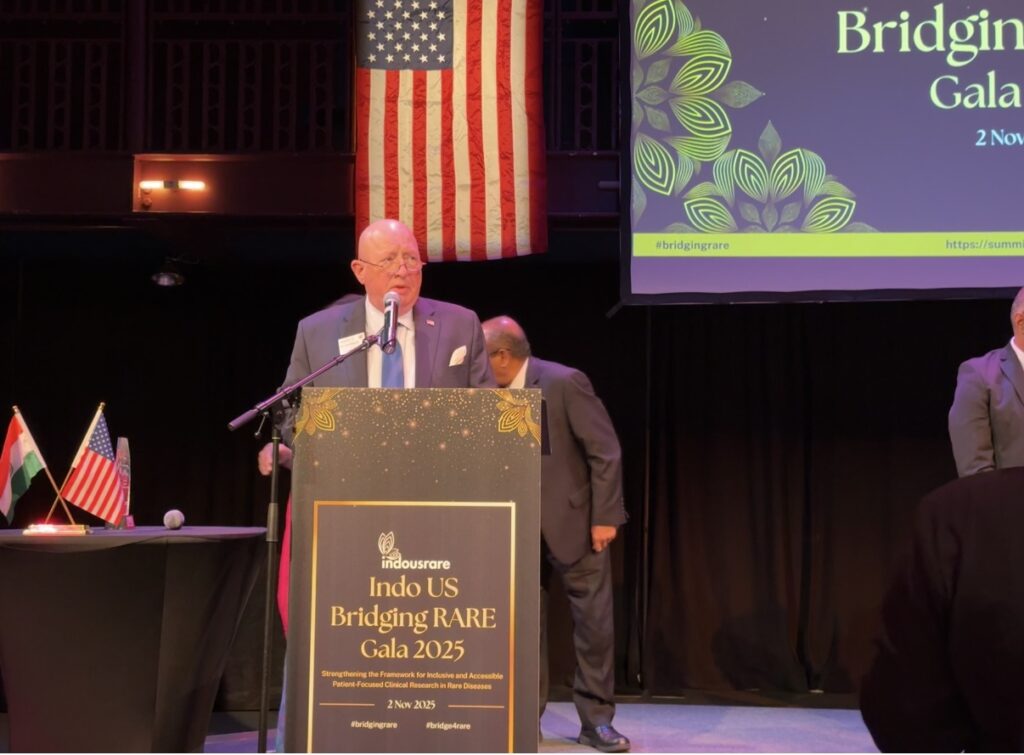
“Relationship-building is at the heart of medical progress,” she said, citing several Indo-US partnerships that have improved diagnostic tools and patient inclusion in clinical research.
Dr. Krishna Madiraju, of Century Pediatrics Inc, spoke about his experience treating children with rare diseases and the difficulties in diagnosis and treatment. He urged greater awareness among policymakers and healthcare providers to improve support systems for affected families.
“Every child deserves timely diagnosis and care,” he said, calling for stronger community engagement and continued advocacy.
At the event, Mohamed Duklef and his wife Sarah Dukmak also shared their journey reflecting on Duklef’s experience with a RARE disease. Loudoun County Treasurer, Henry Eickelberg also spoke at the event.
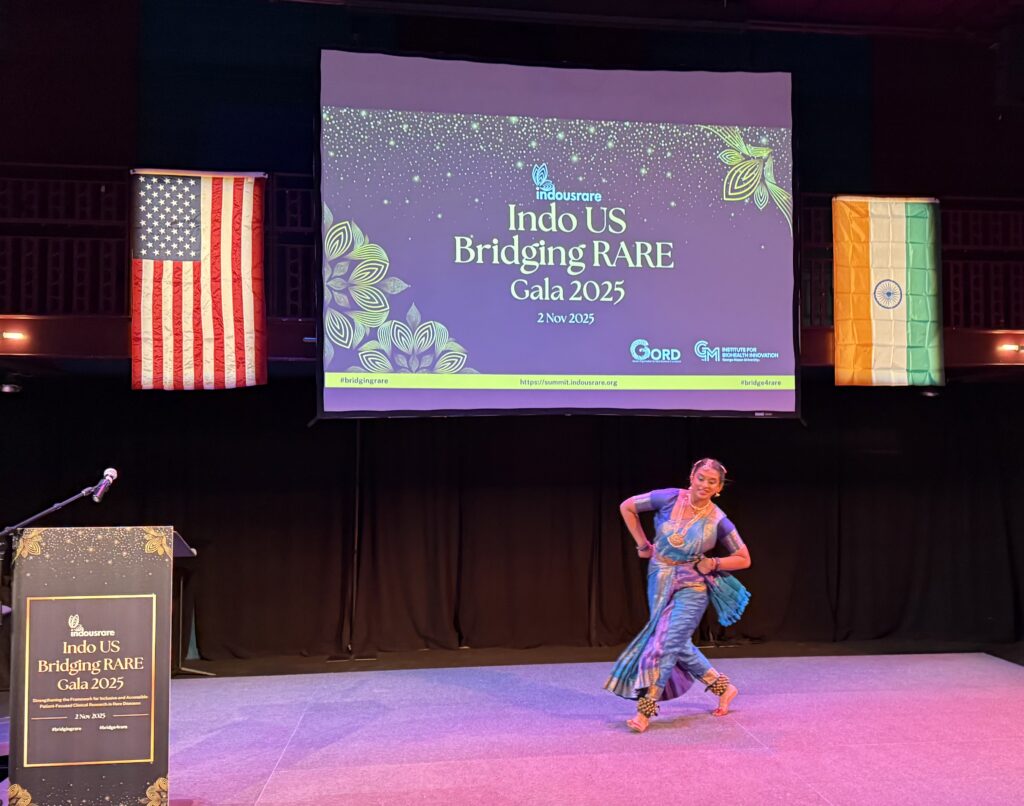
Recognizing Global Leaders in Rare Disease Research
The evening concluded with the presentation of the 2025 Abbey Meyers Khushi Bridging RARE Award, named after both the founder of the National Organization for Rare Disorders (NORD) and Dr. Rajasimha’s late daughter, Khushi.
This year’s honorees – Dr. Priya Kishnani, Dr. Madhulika Kabra, and Dr. Pramod K. Mistry – were recognized for their groundbreaking contributions to rare disease research and patient care.
Rajesh Gooty of Lead America received the Community Impact Award for his pioneering work in technology and community engagement supporting rare disease awareness.


